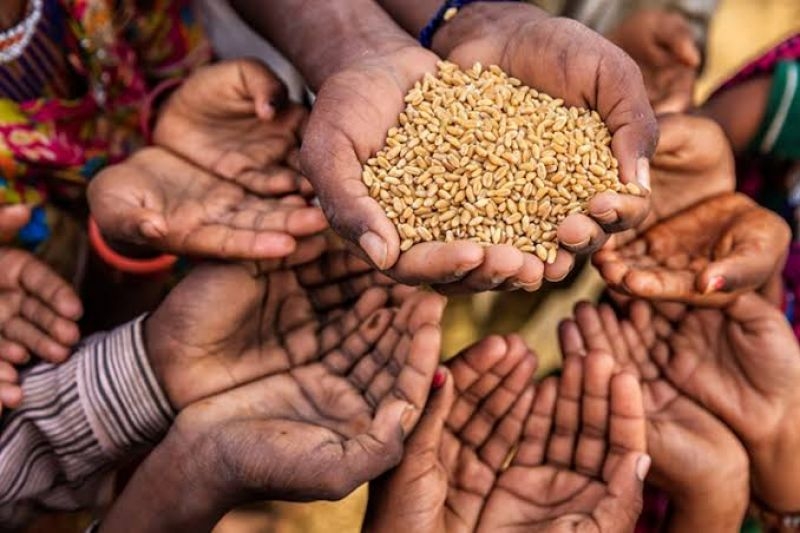- NCP Demands Impeachment, Arrest of President |
- PM Pledges to Modernise, Strengthen Border Force |
- Dhaka Tops Global Pollution List with Hazardous Air |
- Country Observes Martyred Army Day Today |
- 100 CSOs rally against Trump’s trade tactics, urge access to drugs |
Only politics can end world hunger

Food crisis
By Jennifer Clapp, on behalf of the IPES-Food panel, originally published by The Conversation
Massive political efforts are needed to tackle the causes of hunger – conflict, poverty, and inequality. Without confronting power, the harvest will never reach the hungry. IPES-Food statement on food access.
History has shown us again and again that, so long as inequality goes unchecked, no amount of technology can ensure people are well fed.
Today, we produce more food per person than ever before. Yet hunger and malnutrition persist in every corner of the globe – even, and increasingly, in some of its wealthiest countries.
The major drivers of food insecurity are well known: conflict, poverty, inequality, economic shocks, and escalating climate change. In other words, the causes of hunger are fundamentally political and economic.
The urgency of the hunger crisis has prompted 150 Nobel and World Food Price laureates to call for “moonshot” technological innovations to boost food production. However, they largely ignored hunger’s root causes – and the need to confront powerful actors and make courageous political choices.
Food is misallocated
To focus almost exclusively on promoting agricultural technologies to ramp up food production would be to repeat the mistakes of the past.
The Green Revolution of the 1960s brought impressive advances in crop yields (at considerable environmental cost). But it failed to eliminate hunger, because it didn’t address inequality. Take Iowa, home to some of the most industrialized food production on the planet. Amid its high-tech corn and soy farms, 11% of the state’s population, and one in six of its children, struggle to access food.
The world already produces more than enough food to feed everyone. Yet it is shamefully misallocated. Selling food to poor people at affordable prices simply isn’t as profitable for giant food corporations. They make far more by exporting it for animal feed (a wildly inefficient way to nourish people), blending it into biofuels for cars, or turning it into industrial products and ultra-processed foods. To make matters worse, a third of all food is simply wasted.
Meanwhile, as the laureates remind us, shamefully, over 700 million people (9% of the world’s population) remain chronically undernourished, and a staggering 2.3 billion people – over one in four – cannot access an adequate diet.
Confronting inequality
Measures to address world hunger must start with its known causes and proven policies. Brazil’s Without Hunger program, for example, has seen dramatic 85% reductions in severe hunger in just 18 months, through financial assistance, school meals, and minimum wage policies.
Our politicians must confront and reverse gross inequities in wealth, power, and access to land. Hunger disproportionately affects the poorest and most marginalized, not because food is scarce, but because people lack the purchasing power to access it, or resources to produce it for themselves. Redistribution policies aren’t optional, they’re essential.
Governments must put a stop to the use of hunger as a weapon of war. The worst hunger hotspots are conflict zones, as seen in Gaza and Sudan, where violence drives famine. Too many governments have looked the other way on starvation tactics – promoting emergency aid to pick up the pieces, instead of taking action to end the conflicts driving hunger.
Stronger antitrust and competition policies are vital to curb extreme corporate concentration in global food chains – from seeds and agrochemicals to grain trading, meat packing and retail – which allows firms to fix prices and wield outsized political influence.
Governments must break the stranglehold of inequitable trade rules and export patterns that trap the poorest regions in dependency on food imports, leaving them vulnerable to shocks. Instead, supporting local and territorial markets is critical to build resilience to economic and supply chain disruptions. These markets provide livelihoods and help ensure diverse, nutritious foods reach those who need them.
The role of agroecology
Mitigating and adapting to climate change requires massive investments in transformative approaches that promote resilience and sustainability in food systems.
Agroecology is a key solution proven to sequester carbon, build resilience to climate shocks, and reduce dependence on expensive and environmentally damaging synthetic fertilizers and pesticides. More research should explore its full potential.
And we must adopt plant-rich, local and seasonal diets, ramp up measures to tackle food waste, and reconsider using food crops for biofuels. This means pushing back against Big Meat and biofuel lobbies, while investing in climate-resilient food systems.
This is not to say that technology has no role – all hands need to be on deck. The innovations most worth pursuing are those that genuinely support more equitable and sustainable food systems, and not corporate profits. But unless scientific efforts are matched by policies that confront power and prioritize equity over profit, then hunger is likely to stay.
The solutions to hunger are neither new nor beyond reach – what’s missing is the political will to address its root causes. Hunger persists because we allow injustice to endure. If we are serious about ending it, we need bold political action, not just scientific breakthroughs. – Third World Network

